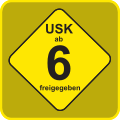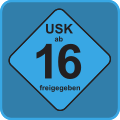| Name | Official translation [7] | Description |
|---|
| Alkohol | Alcohol | The consumption of alcohol is portrayed positively or frequently. |
| Angedeutete Gewalt | Implied violence | Violence is depicted in an abstract and unrealistic manner, with no visible physical contact between characters. No damage or injuries are visible when a character is hit. |
| Belastende Themen | Burdensome themes | The game deals with emotionally stressful themes such as death, bullying and addiction. |
| Comic-Gewalt | Comic violence | The game depicts cartoon violence in an unrealistic setting, characterized by unrealistic weapons, exaggerated effects and the disappearance of enemies upon defeat. |
| Derbe Sprache | Explicit language | The game contains profanity considered particularly harsh or vulgar. |
| Drastische Gewalt | Explicit violence | The game features violence that is "clearly visualized or overly focused". |
| Drogen | Drugs | The use of drugs is portrayed positively or frequently. |
| Druck zum Vielspielen | Pressure to play excessively | The game encourages the player to play frequently and/or for an extended period of time, such as via push notifications, season passes, gifts for returning, and penalizing the player for inactivity. |
| Düstere Atmosphäre | Dark atmosphere | The game features a dark environment which may frighten some players. |
| Erhöhte Kaufanreize | Increased incentives to buy | The game puts increased pressure on the player to make microtransactions, such as via multiple virtual currencies, pay-to-win mechanics, and notifying the player of the imminent expiration of limited time offers. |
| Erhöhte Kommunikationsrisiken | Increased communications risks | The game contains unmoderated chat or does not allow players to block or report one another, which may result in "unwanted, inappropriate or offensive communication." |
| Fantasy-Gewalt | Fantasy violence | Violence is depicted in a fantastical or futuristic setting that is clearly distinguishable from reality. |
| Gewalt | Violence | Violence may appear realistic or is the main theme of the game. |
| Glücksspielthematik | Gambling themes | The game contains gambling elements that may promote a positive attitude towards real-life gambling. |
| Handlungsdruck | Pressure to act | The game puts direct or indirect pressure on the player to take action via stressful situations such as time limits, boss battles, a high number of opponents, rewards for playing frequently, or limited time offers. |
| Horror | The game features horror themes and effects. |
| Kontaktrisiken | Contact risks | The game allows players to display personal information such as real names and locations, which may create the risk of unsecure contact. |
| Kriegsthematik | War themes | The game is set during wartime, and violence is thus an integral part of gameplay. |
| Problematische Werbeinhalte | Problematic advertising content | The game contains advertising considered "more relevant to the protection of minors" than the game itself. |
| Schimpfwörter | Occasional swearing | The game contains profanity. |
| Schreckmomente | Scary moments | Elements featured in the game may frighten some players. |
| Sexualisierte Gewalt | Sexualised violence | Sexual violence is clearly depicted. |
| Sexuelle Andeutungen | Sexual innuendo | The game contains sexually suggestive content. |
| Sexuelle Inhalte | Sexual content | Sex is the main theme of the game, or explicit sexual acts are depicted or alluded to. |
| Tabakkonsum | Tobacco use | The use of tobacco is portrayed positively or frequently. |





